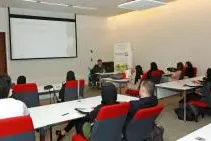PHOTO
The nonprofit organization promoted Leadership, Service Learning and Global Citizenship through the Annual Youth Conference
Doha, Qatar - Qatar Assistive Technology Center (Mada) took part in the Annual Youth Conference, Empower 2017, which was held on March 2 – 4. During the event, Mada hosted a workshop that discussed the fundamentals of accessibility and its universal design, which was presented by Ahmed Habib a Policy Expert at Mada. Held at the Hamad Bin Khalifa University - Student Center at Qatar Foundation, the participation in Empower 2017 supported Mada in reaching its strategic goals and teaching others about the importance of building accessible spaces, content and programs.
Maha al Mansouri, CEO, Mada commented, “At Mada, we continue to strive to participate and support local events in Qatar, as they are a great platform for us to bring awareness and share knowledge . We also aim to educate the community about the importance of assistive technology and how much it can change the lives of persons with disabilities and help transform a disability to an ability. Empower 2017 is a great opportunity for us to support the youth with disabilities and we hope to help their parents and their communities understand that they have the same potential as any person does when they are properly directed to the right assistive technology that suits their individual needs and situation.”
Mada’s strategic goals and operational focus revolves around three key areas: education, employment, and community. Through this workshop, Mada was able educating the youth community – the future generation of content creators, event planners, designers and program coordinators – about building a culture of accessibility and inclusion into the workplace. Empower 2017 conference addressed a variety of issues related to Sustainable Development. This year, it also focused on Sustainable Tourism for Youth Development.
Ahmed Habib, an expert in accessibility and communications in the areas of disability and inclusion lead the workshop. The session looked at exploring and challenging the common societal misinterpretations and prejudices of disability, largely derived from traditional models of disability. As well as exploring how accessible and universal design can result in more effective and impactful delivery of services, content and experiences. It also considered the main obstacles that people with disabilities face, namely attitudes and a lack of awareness, highlighting the importance of accessible thinking as the key to success in different careers and towards building a city and a society that is better for all.
© Press Release 2017




















